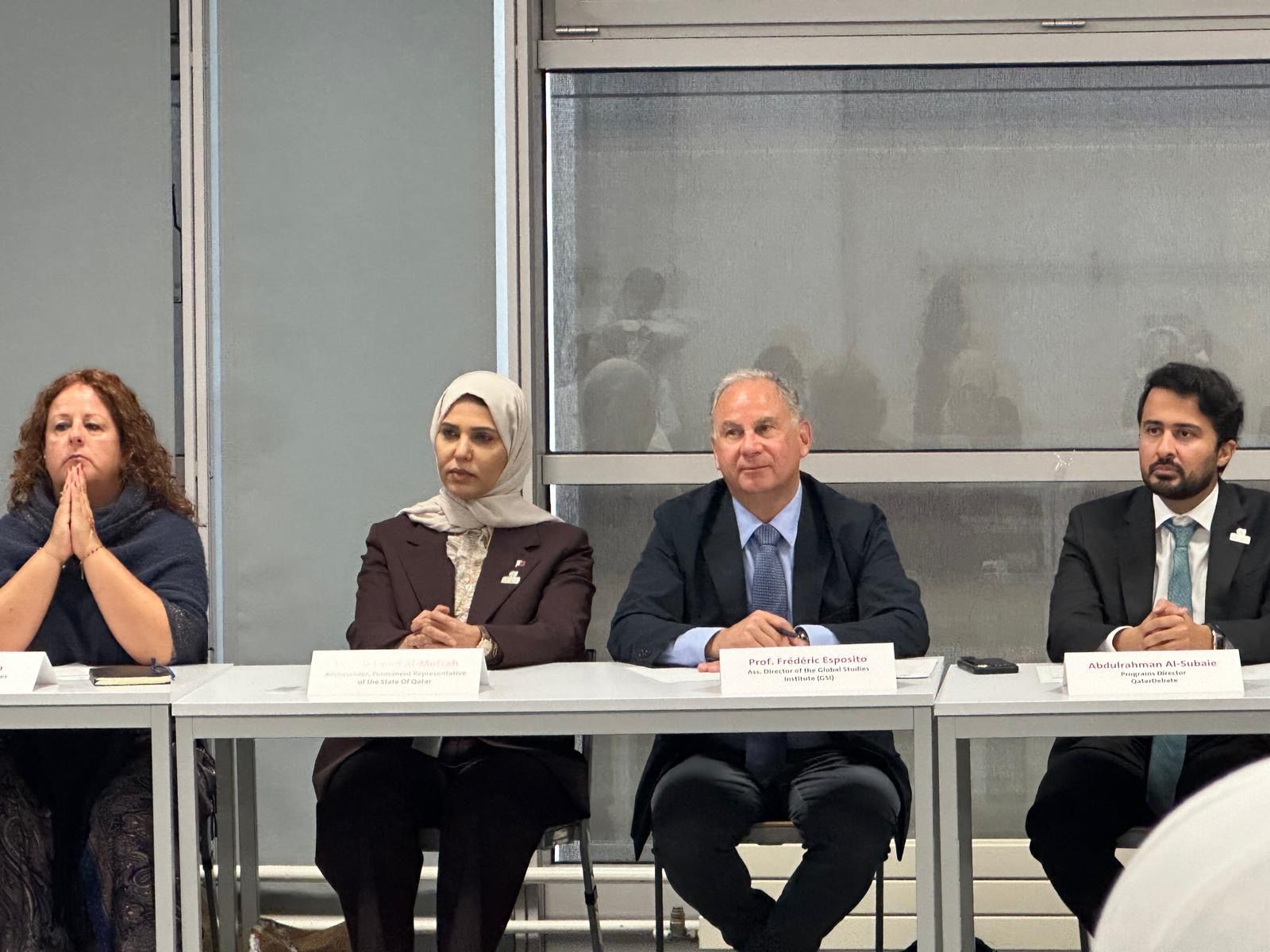Qatar's Permanent Representative to UN Office at Geneva Participates in Roundtable on "Equity in Education"

Geneva, September 8, 2025
HE Permanent Representative of the State of Qatar to the United Nations Office in Geneva, Dr. Hind Abdulrahman Al Muftah, participated in a roundtable entitled "Equity in Education," held in collaboration between QatarDebate and the University of Geneva, on Monday at the University of Geneva.
In her remarks, Her Excellency emphasized that education is not a privilege, but rather a fundamental human right. It is the key to enabling individuals to develop basic skills, express their opinions, and claim, enjoy, and protect all other human rights.
This right is enshrined in international human rights treaties and constitutes a fundamental pillar of the 2030 Agenda for Sustainable Development.
HE Dr. Hind added that education benefits both individuals and societies, as it provides learners with the knowledge, skills, and values necessary for human, social, and economic development.
She pointed out that education is an essential component of global recovery, achieving all Sustainable Development Goals, building peaceful and resilient societies, and facing contemporary challenges, including the green transition and digital transformation.
She emphasized that education inspires hope and provides protection for those affected by conflict, displacement, and humanitarian crises.
Her Excellency explained that achieving equality in education has become more urgent than ever, emphasizing that equality does not only mean equal access, but also includes ensuring equitable outcomes and adapting resources and opportunities to meet diverse needs so that no one is left behind, which is the essence of Goal 4 of the Sustainable Development Goals.
Her Excellency noted that the State of Qatar has always been a strong advocate for the right to education, stressing that ensuring equitable and quality education remains one of its top national and international priorities.
She explained that at the national level, the State of Qatar has invested in a distinguished education system that consistently ranks high in regional and international indicators.
She noted that the State of Qatar has promoted equal access and gender equality, ensuring that Qatari women play an increasingly important role in higher education and the labor market, particularly in the education, health, and social services sectors.
Her Excellency highlighted Qatar's prominent role on the international stage in advancing education-related initiatives within the United Nations framework.
In 2010, Qatar, alongside several member states, introduced Resolution 64/290, affirming the right to education in emergency situations - a measure unanimously adopted by the UN General Assembly.
In 2020, the General Assembly again reached consensus on Resolution 74/275, which designated September 9 as the International Day to Protect Education from Attack. In March 2024, Qatar submitted a resolution to UNESCO's Executive Board focused on safeguarding education in conflict zones.
The resolution, adopted unanimously, established a preventive mechanism aimed at protecting learning environments in areas affected by violence and instability.
She added that the State of Qatar was among the first supporters of the Safe Schools Declaration in 2015 and is a founding member of the Global Coalition to Protect Education from Attack.
HE the Permanent Representative of the State of Qatar to Geneva said that children are the future, and their education is the antidote to intolerance, inequality, conflict, and poverty. She emphasized that education must remain the top priority to achieve peace and prosperity.
She also emphasized that the State of Qatar's vision is clear, "Education above all."
The event aimed to discuss various aspects related to achieving educational justice through an interactive dialogue that brought together youth with a select group of academics, experts, and civil society representatives.
The panel highlighted the challenges resulting from conflicts and social and economic disparities, the mental health issues of students affected by conflict, and the obstacles facing displaced children.
It also addressed the role of the international community in ensuring the right to education.
The discussion also addressed the opportunities of technology and media in promoting educational justice, while emphasizing awareness of the risks associated with their use.
The session featured young speakers representing the Ministry of Sports and Youth, QatarDebate Center, and Education Above All Foundation, as well as youth from around the world and prominent academics.
Al Reem Al Aqili, moderator of the session from QatarDebate Center, emphasized that the discussion represented an opportunity to connect academic expertise with youth voices in a safe dialogue space.
She noted that the dialogue reflected a shared commitment to making educational justice a tangible reality, contributing to building a more equitable and inclusive world and enhancing the role of youth and international institutions in shaping a better educational future for all.
It's worth noting that this session coincides with the International Day to Protect Education from Attack and aims to discuss aspects related to achieving justice in education with a group of influential figures who are committed to developing the education system.

